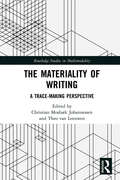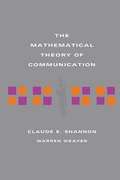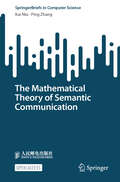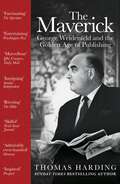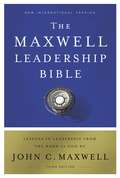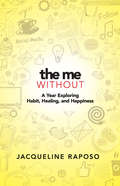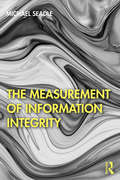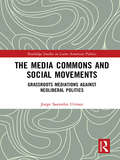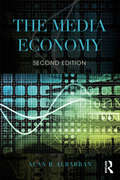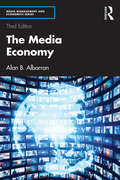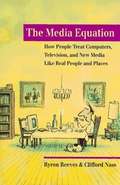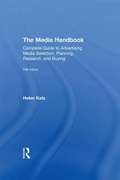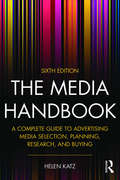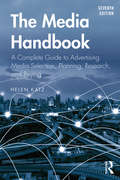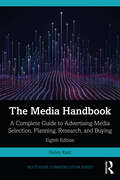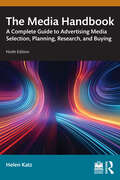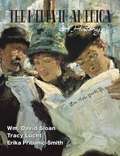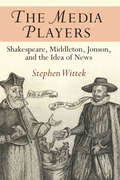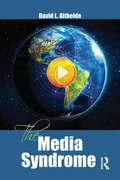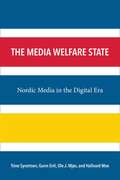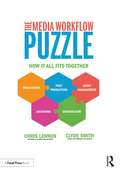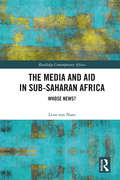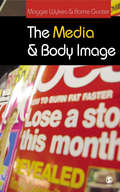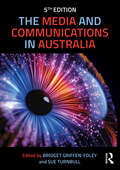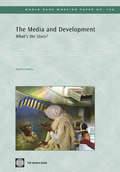- Table View
- List View
The Materiality of Writing: A Trace Making Perspective (Routledge Studies in Multimodality)
by Christian Mosbæk Johannessen Theo van LeeuwenThis book examines the materiality of writing. It adopts a multimodal approach to argue that writing as we know it is only a small part of the myriad gestures we make, practices we engage in, and media we use in the process of trace-making. Taking a broad view of the act of writing, the volume features contributions from both established and up-and-coming scholars from around the world and incorporates a range of methodological and theoretical perspectives, from fields such as linguistics, philosophy, psychology of perception, design, and semiotics. This interdisciplinary framework allows readers to see the relationships between writing and other forms of "trace-making", including architectural drawings, graphic shapes, and commercial logos, and between writing and reading, with a number of illustrations highlighting the visual data used in the forms and studies discussed. The book also looks forward to the future, discussing digital media and new technology and their implications for trace-making. This pioneering volume will be of interest to scholars and researchers in multimodality, literacy, cognitive neuroscience, design theory, discourse analysis, and applied linguistics.
The Mathematical Theory of Communication
by Warren Weaver Claude E ShannonScientific knowledge grows at a phenomenal pace--but few books have had as lasting an impact or played as important a role in our modern world as The Mathematical Theory of Communication, published originally as a paper on communication theory more than fifty years ago. Republished in book form shortly thereafter, it has since gone through four hardcover and sixteen paperback printings. It is a revolutionary work, astounding in its foresight and contemporaneity. The University of Illinois Press is pleased and honored to issue this commemorative reprinting of a classic.
The Mathematical Theory of Semantic Communication (SpringerBriefs in Computer Science)
by Ping Zhang Kai NiuThis Open Access Book explores how classical information theory&’s focus on syntactic information has limited the further development of communication science. Recently, communication technologies that handle and transmit semantic information have gained widespread attention in academia. Semantic communication has paved new directions for the future of communication technology development, yet it lacks a general mathematical guiding theory. To address this challenge, this open access book constructs a theoretical framework for semantic information theory and provides a systematic exposition of the measurement system for semantic information and the theoretical limits of semantic communication. It serves as a professional reference for researchers in information and communication. The book begins by deeply analyzing the data characteristics of various information sources and the needs of downstream tasks to summarize and generalize the universal attribute of semantic information—synonymity and to define the synonymous mapping between semantic information and syntactic information. Stemming from this core concept, synonymous mapping, this book introduces the measures of semantic information. It then introduces a new mathematical tool, Synonymous Asymptotic Equipartition (AEP), to explore the mathematical properties of synonymous typical sequences and applies random coding and synonymous typical sequence decoding/encoding to prove the semantic lossless source coding theorem, semantic channel coding theorem, and semantic limited distortion source coding theorem. In addition, the semantic information measures in the continuous case are discussed and a new channel capacity formula of the band-limited Gaussian channel is obtained, which is an important extension of the classical channel capacity. The book is a valuable resource for researchers, academics, and professionals in the field of information and communication, particularly those interested in advancing the frontiers of semantic communication technology.
The Maverick: George Weidenfeld and the Golden Age of Publishing
by Thomas HardingBorn into a Jewish family in Vienna in 1919, George Weidenfeld fled to England in 1938 to escape the Nazi regime. There he began a career in publishing that would make him one of the most influential figures in the industry. Over the course of his long and illustrious career he championed some of the most important voices of the twentieth century, from Vladimir Nabokov, Mary McCarthy and Saul Bellow to Harold Wilson, Isaiah Berlin and Henry Kissinger.But what do we know about the man himself? Was he, as described by some, the 'greatest salesperson', 'the world's best networker', 'the publisher's publisher' and 'a great intellectual'? Was his lifelong effort to be the world's most famous host a cover for his desperate loneliness? Who, in fact, was the real George Weidenfeld and how did he rise so successfully within the ranks of London and New York society? Providing a full, unvarnished and at times difficult history of this complex man, this first biography of a titan of culture is also a story of resilience, determination and the power of ideas to shape history.
The Maxwell Leadership Bible: New International Version
by Thomas NelsonEvery believer is a person of influence. In the Maxwell Leadership Bible, leadership expert John C. Maxwell shows you the principles of leadership taught in God’s Word and how to use them. Whether you are an employee, a boss, a parent, or a neighbor, you are a person of influence in your part of the world. Throughout the pages of Scripture, John Maxwell has assembled the time-tested and irrefutable biblical principles of leadership to equip and encourage leaders with his signature approach, including the 21 Laws of Leadership, the 21 Qualities of a Leader, biographical profiles, and hundreds of notes.Features include:Now available in the NIV Comfort Print® typefaceOver 120 “Profiles in Leadership” lessons drawn from the people of the BibleHundreds of compelling short articles and notes on mentoring and influenceA complete reference index to the 21 Laws of Leadership and the 21 Qualities of a LeaderClear and readable 10-point print size
The Me, Without: A Year Exploring Habit, Healing, and Happiness
by Jacqueline RaposoA Main Selection of the One Spirit Book Club!"Raposo's engaging report on stripping life down will inspire readers looking for manageable tweaks to hectic living." — Publishers WeeklyAt the age of thirty-four, journalist Jacqueline Raposo finds herself sick, single, broke, and wandering in a fog. Despite decades of discipline, her chronic illness is getting worse. Despite hosting a radio show about dating, she hasn't been in love in years. And despite a successful writing career, she's deeply in debt. Weary of trying to solve her problems by adding things to her life, she attempts the opposite and subtracts some of her most constant habits — social media, shopping, sugar, and negative thoughts — for periods of thirty to ninety days over the course of one year.In this intimately curated search for self-improvement (a quest that readers can easily personalize for themselves), Raposo confesses to the sometimes violent and profound shifts in her social interactions, physical health, and sense of self-worth. With the input of doctors, psychologists, STEM experts, and other professionals, she offers fascinating insights into how and why our brains and bodies react as they do to our habits. She also sheds light on the impact of our everyday choices on our mental state. Part memoir, part case study, this book offers you an inspiring example of how to forge your own journey, expose your wounds, and help yourself heal. "No cheesy self-help here, The Me, Without is sharply written and massively relatable. Raposo packs a powerful message into an emotional and entertaining read." — Kaia Roman, author of The Joy Plan"Jacqueline is able to make me chuckle with one sentence and then have a deep introspective moment in the next. Her openness and honesty is truly amazing. If you have been looking to examine your relationship with the world, this is the book for you!" — Travis McElroy, host of the podcasts My Brother, My Brother, and Me and The Adventure Zone"So many of us live in terror of deprivation, whether it's tangible, edible, social, physical, financial, or emotional, because we are terrified of what we'll see when we're stripped bare. In Jacqueline Raposo's brave, rigorous, and vulnerable exploration of what it means to live without, the author uses periods of deliberate abstinence from habits to find new ways to engage with the world, determine what's been pinning her in place, and reveal the person she truly can be when she's freed of it all. It's essential reading for anyone on the cusp of making a major life change — or even a minor one." — Kat Kinsman, author of Hi, Anxiety
The Measurement of Information Integrity
by Michael SeadleArguing that there never was a time when politicians did not prevaricate and when some communities did not doubt conclusions that others considered to be facts, The Measurement of Information Integrity puts the post-truth era in context and offers measures for integrity in the modern world. Incorporating international examples from a range of disciplines, this book provides the reader with tools that will help them to evaluate public statements - especially ones involving the sciences and scholarship. It also provides intellectual tools to those who must assess potential violations of public or academic integrity. Many of these tools involve measurement mechanisms, ways of putting cases into context, and a recognition that few cases are simple black-and-white violations. Demonstrating that a binary approach to judging research integrity fails to recognize the complexity of the environment, Seadle highlights that even flawed discoveries may still contain value. Finally, the book reminds its reader that research integrity takes different forms in different disciplines and that each one needs separate consideration, even if the general principles remain the same for all. The Measurement of Information Integrity will help those who want to do research well, as well as those who must ascertain whether results have failed to meet the standards of the community. It will be of particular interest to researchers and students engaged in the study of library and information science.
The Media Commons and Social Movements: Grassroots Mediations Against Neoliberal Politics (Routledge Studies in Latin American Politics)
by Jorge Saavedra UtmanWhat does it mean to have a voice in a formal democracy operating under neoliberal guidelines and with an almost entirely private media system? How can the people gain their voice and engage in a dialogue with hegemonic actors and discourses? In this book, Jorge Saavedra Utman examines the role of media and communicative practices during one of the largest social mobilizations in Latin America in the last 30 years: Chile’s 2011 students’ movement. Saavedra Utman observes the eye-catching, subversive, but also intimate practices that, in a country with a liberal democracy and neoliberal policies, allowed people to speak up and become political actors from grassroots positions. Presenting rich qualitative data that is sourced from interviews and focus groups with activists, he introduces a fresh perspective on the study of media and communications and social movements. Saavedra Utman paints a clearer picture of contentious events since 2011 - like the Arab Spring and Occupy – to understand the relevance of media and communications in contemporary quests for participation and democracy. Promising to be an important book, The Media Commons and Social Movements represents a significant contribution to our understanding of communicative dimensions of protest and social change.
The Media Economy (Media Management and Economics Series)
by Alan B. AlbarranThe Media Economy analyzes the media industries and its activities from macro to micro levels, using concepts and theories to demonstrate the role the media plays in the economy as a whole. Representing a rapidly changing and evolving environment, this text breaks new ground through its analysis from two unique perspectives: 1) Examining the media industries from a holistic perspective by analyzing how the media industries function across different levels of society (global, national, household, and individual); 2) Looking at the key forces (technology, globalization, regulation, and social aspects) constantly evolving and influencing the media industries. Building on the contributions of the original text, this Second Edition provides new references and current data to define and analyze today’s media markets. To understand the role of media in the global economy, the insights included here are crucial for media students and practitioners.
The Media Economy (Media Management and Economics Series)
by Alan B. AlbarranThis fully updated third edition analyzes the media industries and their activities from macro to micro levels, using concepts and theories to demonstrate the role the media plays in the economy as a whole. This textbook breaks new ground through its analysis of the rapidly changing and evolving media economy from two unique perspectives. First, the book explores how media industries function across global, national, household, and individual levels of society. Second, it assesses how key forces such as technology, globalization, regulation, and consumer aspects are constantly evolving and influencing media industries. This new edition incorporates thoroughly updated theory and research as well as expanded case studies that include examples from international markets such as Asia, Europe, and Latin America. It builds on the contributions of the previous edition by providing new references and current data to define and analyze today’s media markets and offers a more expansive assessment of streaming business models as well as the effects of Covid-19 on the media economy. Written in an accessible style and presenting a holistic global perspective of the role of media in the global economy, the textbook provides crucial insights for students and practitioners of media economics, media management and media industries.
The Media Equation: How People Treat Computers, Televisions, and New Media Like Real People and Places
by Byron Reeves Clifford NassAccording to popular wisdom, humans never relate to a computer or a television program in the same way they relate to another human being. Or do they? The psychological and sociological complexities of the relationship could be greater than you think. In an extraordinary revision of received wisdom, Byron Reeves and Clifford Nass demonstrate convincingly in The Media Equation that interactions with computers, television, and new communication technologies are identical to real social relationships and to the navigation of real physical spaces. Using everyday language, the authors explain their novel ideas in a way that will engage general readers with an interest in cutting-edge research at the intersection of psychology, communication and computer technology. The result is an accessible summary of exciting ideas for modern times. As Bill Gates says, '(they) ... have shown us some amazing things'.
The Media Handbook: A Complete Guide to Advertising Media Selection, Planning, Research, and Buying
by Helen KatzThe Media Handbook provides a practical introduction to the advertising media planning and buying process. Emphasizing basic calculations along with the practical realities of offering alternatives and evaluating the plan, this fifth edition reflects the critical changes in how media is planned, bought, and sold by today's industry professionals. Author Helen Katz looks at the larger marketing, advertising, and media objectives, and follows with an exploration of major media categories, including digital media. She provides a comprehensive analysis of planning and buying, with a continued focus on how those tactical elements tie back to the strategic aims of the brand and client. Also available is a Companion Website that expands The Media Handbook's content in an online forum. Here, students and instructors can find tools to enhance course studies such as chapter overviews, PowerPoint slides, and sample questions. With its emphasis on real-world industry practice, The Media Handbook provides an essential introduction to students in advertising, media planning, communication, and marketing. It serves as an indispensable reference for anyone pursuing a career in media planning, buying, and research.
The Media Handbook: A Complete Guide to Advertising Media Selection, Planning, Research, and Buying (Lea’s Communication Series)
by Helen KatzThe Media Handbook provides a practical introduction to the advertising media planning and buying processes. Emphasizing basic calculations and the practical realities of offering alternatives and evaluating the plan, this sixth edition reflects the critical changes in how advertising in various media is planned, bought, and sold by today’s industry professionals. Author Helen Katz looks at the larger marketing, advertising, and media objectives, and follows with an exploration of major media categories, covering paid, owned, and earned media forms, including digital media. She provides a comprehensive analysis of planning and buying, with a continued focus on how those tactical elements tie back to the strategic aims of the brand and the client. Also available is a Companion Website that expands The Media Handbook’s content in an online forum. Here, students and instructors can find tools to enhance course studies such as chapter overviews, PowerPoint slides, and sample questions. With its emphasis on real-world industry practice, The Media Handbook provides an essential introduction to students in advertising, media planning, communication, and marketing. It serves as an indispensable reference for anyone pursuing a career in media planning, buying, and research.
The Media Handbook: A Complete Guide to Advertising Media Selection, Planning, Research, and Buying (Routledge Communication Series)
by Helen KatzThe Media Handbook provides a practical introduction to the advertising, media planning, and buying processes. Emphasizing basic calculations and the practical realities of offering alternatives and evaluating the plan, this seventh edition includes greater coverage of social media, buying automation, the continued digitization of media, and updated statistics on media consumption. It covers over the top television, programmatic TV, digital advertising, and the automation of buying across all media. Author Helen Katz provides a continued focus on how planning and buying tie back to the strategic aims of the brand and the client, keeping practitioners and students up to date with current industry examples and practices. The Companion Website to the book includes resources for both students and instructors. For students there are flashcards to test themselves on main concepts, a list of key media associations, a template flowchart and formulas. Instructors can find lecture slides and sample test questions to assist in their course preparation.
The Media Handbook: A Complete Guide to Advertising Media Selection, Planning, Research, and Buying (Routledge Communication Series)
by Helen KatzThe eighth edition of The Media Handbook continues to provide a practical introduction to the media planning and buying processes. Starting with the broader context in which media planning occurs, including a basic understanding of competitive spending and target audiences, the book takes readers through the fundamentals of each media channel, leading to the creation of a media plan. Throughout, concepts and calculations are clearly explained. This new edition reflects the changes in how people consume media today with: a new chapter on how audiences are defined and created reorganization of the media channel chapters to cover planning and buying together expanded coverage of digital formats in all channels added discussion of measurement completely updated data and examples. The Media Handbook, Eighth Edition is the ideal text for courses in media planning and buying in advertising/communication departments. Supplemental online resources for both students and instructors are also available. For students, there is a list of key media associations and chapter overviews. To assist in their course preparation, instructors will find lecture slides, sample test questions, and new sample media planning exercise scenarios with accompanying practice spreadsheets. These resources are available at www.routledge.com/9780367775568, under Support Material.
The Media Handbook: A Complete Guide to Advertising Media Selection, Planning, Research, and Buying (Routledge Communication Series)
by Helen KatzNow in its 9th edition, The Media Handbook introduces students to the media planning and buying process with a concise and industry-informed approach.The book takes readers through the fundamentals of each media channel, leading to the creation of a media plan. This edition features a revised and expanded chapter on digital media for both planning and buying (including programmatic), with additional material on artificial intelligence, the metaverse and augmented/virtual reality, and streaming. It also includes more charts and tables to provide additional visual appeal and understanding. Newly updated data, more international brand examples, and a summary of key media calculations round out this thoroughly updated edition.This text remains ideal for courses in media planning and buying in advertising and mass communication departments.Supplemental online resources for both students and instructors are also available. To assist in their course preparation, instructors will find lecture slides and sample test questions while students will benefit from chapter overviews and new sample media planning exercise scenarios with accompanying practice spreadsheets. Please visit www.routledge.com/9781032671369.
The Media In America: A History
by Wm. David Sloan Tracy Lucht Erika Pribanic-SmithThe Media in America: A History
The Media Players
by Stephen WittekThe Media Players: Shakespeare, Middleton, Jonson, and the Idea of News builds a case for the central, formative function of Shakespeare's theater in the news culture of early modern England. In an analysis that combines historical research with recent developments in public sphere theory, Dr. Stephen Wittek argues that the unique discursive space created by commercial theater helped to foster the conceptual framework that made news possible. Dr. Wittek's analysis focuses on the years between 1590 and 1630, an era of extraordinary advances in English news culture that begins with the first instance of serialized news in England and ends with the emergence of news as a regular, permanent fixture of the marketplace. Notably, this period of expansion in news culture coincided with a correspondingly extraordinary era of theatrical production and innovation, an era that marks the beginning of commercial theater in London, and has left us with the plays of William Shakespeare, Ben Jonson, and Thomas Middleton. Book jacket.
The Media Syndrome
by David AltheideOver the past 45 years, award-winning sociologist David L. Altheide has illuminated how media formats and media logic affect our understanding of social issues, of how political decisions are made, and of how we relate to each other. In this masterful, summative work, Altheide describes the media syndrome: how these factors shape our expectations of, and reactions to, both public and personal events. Ideal for courses on mass media and political communication, the book provides a detailed description of the media syndrome and its impact on daily life; uses historical and contemporary examples from Watergate to Edward Snowden; includes the changes in the ecology of communication from mass media to social media and its social impact.
The Media Welfare State: Nordic Media In The Digital Era
by Ole J. Mjøs Hallvard Moe Trine Syvertsen Gunn Sara EnliThe Media Welfare State: Nordic Media in the Digital Era comprehensively addresses the central dynamics of the digitalization of the media industry in the Nordic countries--Sweden, Norway, Denmark, Finland, and Iceland--and the ways media organizations there are transforming to address the new digital environment. Taking a comparative approach, the authors provide an overview of media institutions, content, use, and policy throughout the region, focusing on the impact of information and communication technology/internet and digitalization on the Nordic media sector. Illustrating the shifting media landscape the authors draw on a wide range of cases, including developments in the press, television, the public service media institutions, and telecommunication.
The Media Workflow Puzzle: How It All Fits Together
by Chris LennonThis edited collection brings together a team of top industry experts to provide a comprehensive look at the entire media workflow from start to finish. The Media Workflow Puzzle gives readers an in-depth overview of the workflow process, from production to distribution to archiving. Pulling from the expertise of twenty contributing authors and editors, the book covers topics including content production, postproduction systems, media asset management, content distribution, and archiving and preservation, offering the reader an understanding of all the various elements and processes that go into the media workflow ecosystem. It concludes with an exploration of the possibilities for the future of media workflows and the new opportunities it may bring. Professionals and students alike looking to understand how to manage media content for its entire lifecycle will find this an invaluable resource.
The Media and Aid in Sub-Saharan Africa: Whose News? (Routledge Contemporary Africa)
by Lena von NasoNews coverage on Africa is closely connected not only with how Western audiences see the continent, but also with how a wide Western audience builds its opinion on issues that carry consequences for the public's and governments' support and policy towards development aid. The Western media reinforce a picture of a continent that drowns in chaos, is dominated by conflicts, diseases, corruption and failed democratisation. Whose interests lie behind that? How does foreign news on sub-Saharan Africa emerge, which actors are relevant in its making, and on the basis of what interests do these actors shape the coverage that is then presented as 'neutral information' to a broad international audience? Closely examining the relationship between foreign correspondents of international news media and humanitarian organisations, Lena von Naso shows how the aid and media sectors cooperate in Africa in a unique way. Based on more than 70 interviews with foreign correspondents and aid workers operating across Africa, the book argues that the changing nature of foreign news and of aid is forcing them to form a deep co-dependency that is having a serious and largely unnoticed effect on Western news coverage. This comprehensive examination of a new paradigm will interest students and scholars of media and journalism, African studies, development and humanitarian studies and the aid and media communities operating across Africa.
The Media and Body Image: If Looks Could Kill
by Barrie Gunter Maggie WykesBlaming the media for reproducing and extolling unrealistic female bodies has almost become a popular truism. Even medical opinion notes that the media can influence young women to starve themselves and therefore act as a possible causal factor of disordered eating. Yet surprisingly, little work has addressed either the nature of media representations of the body, or the ways in which audiences interpret and use such images in our contemporary cultural context. The Media and Body Image addresses this lack and: - Draws together literature from sociology, gender studies and psychology - Brings together new empirical work on both media representations and audience responses - Offers a broad discussion of this topic in the context of socio-cultural change, gender politics, and self-identity.
The Media and Communications in Australia
by Sue Turnbull Bridget Griffen-FoleyAt a time when the traditional media have been reshaped by digital technologies and audiences have fragmented, people are using mediated forms of communication to manage all aspects of their daily lives as well as for news and entertainment. The Media and Communications in Australia offers a systematic introduction to this dynamic field. Fully updated and expanded, this fifth edition outlines the key media industries – from print, sound and television to film, gaming and public relations – and explains how communications technologies have changed the ways in which they now operate. It offers an overview of the key approaches to the field, including a consideration of Indigenous communication, and features a ‘hot topics’ section with contributions on issues including diversity, misinformation, algorithms, COVID-19, web series and national security. With chapters from Australia’s leading researchers and teachers in the field, The Media and Communications in Australia remains the most comprehensive and reliable introduction to media and communications from an Australian perspective. It is an ideal student text and a key resource for teachers, lecturers, media practitioners and anyone interested in understanding these influential industries.
The Media and Development: What's the Story?
by Gareth LocksleyThe media's contribution to development occurs simultaneously along five closely intermingled influences: plurality and transparency, behavioral, infrastructure and platform, economic, and trade. The media are at the cutting edge of technological change, where the digitalization of content, Next Generation Networks, falling device and distribution costs, ever-increasing abundance and new business models are overturning the pre-existing order of markets and the media, though broadcasting, particularly radio, remain crucial in developing countries. This offers new development opportunities requiring new policy initiatives, and the realization of this by the development community. In many instances the media has yet to attain its appropriate status on the list of development priorities.
